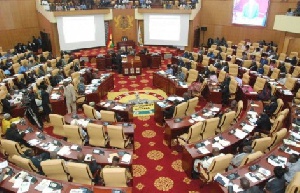Ghana should consider setting a minimum educational qualification for parliamentarians if it intends to, in the long-term, improve the quality of deliberations in the House or the general work of parliament, suggests Dr Eric Oduro Osae, Dean of Graduate Studies at the Institute of Local Government.
He said a legislator needed to be “on top of issues” before getting up to talk, and against the backdrop that the use of the English Language as the official medium of discussion in the house is not a native tongue, those with a limited ability to expressing themselves in the language or with a low educational status are hampered in making contributions on the floor of the house, lowering the standard of discussion.
However, he stated that beyond overcoming the linguistic barrier, there was the need to be competent and conversant with issues to enrich discussions.
“Quality in terms of calibre and qualification of parliamentarians have a bearing on [debate] and even the laws they pass as parliamentarians because the work of parliament is not an easy task. They are an important arm of our government responsible for making laws. And in the formulation of some laws, lifetime experiences are required. It may call for someone who has worked in that sector for a considerable time and knows the consequences of the decisions he makes,” he stated on Accra100.5FM’s Ghana Yensom on Tuesday June 14.
“Somebody can find his way into parliament by buying his way out, that is also possible. Especially if you look at our Constitution we have no educational qualification requiring one to be able to read and write before going to parliament.”
He said the country’s political parties could play their part by electing the most competent aspirants in their primaries instead of electing persons on grounds of mere popularity, though he warned legal issues could arise from such a move.
“Parliament is about getting the most popular person from a particular constituency, it is not about getting the most competent person. The purpose of elections is to elect the most popular person. So if we want to improve the calibre, the quality, and the background of people in parliament then we should introduce some competence criteria in the process so that when every party is interviewing its aspiring parliamentary candidates, they will lay down a qualification that say, if you have no degree or HND, you cannot be made to represent. But it may lead to court action as there is no such restriction in the constitution, so the party has no right to restrict them. That also becomes an issue.”
He referred to a Zambian example where the country was trying to enact legislation to ensure that assemblyman or councillor aspirants had a minimum academic qualification of Grade 12 to be eligible to contest for such positions.
“If we were to do a similar thing with our parliament it would help us in terms of the quality of debate,” he added, though he admitted that partisan interests, too, sometimes marred the quality of debates.
General News of Wednesday, 15 June 2016
Source: classfmonline.com













